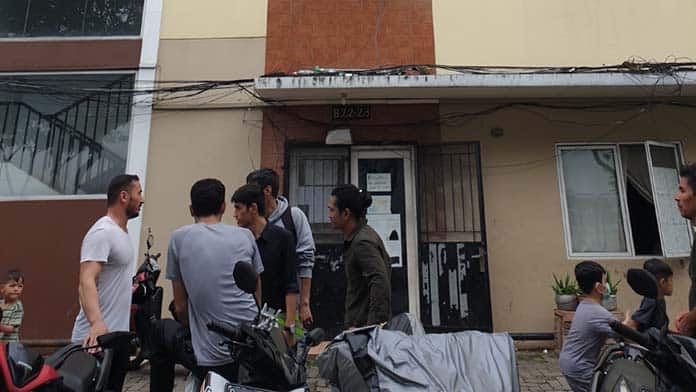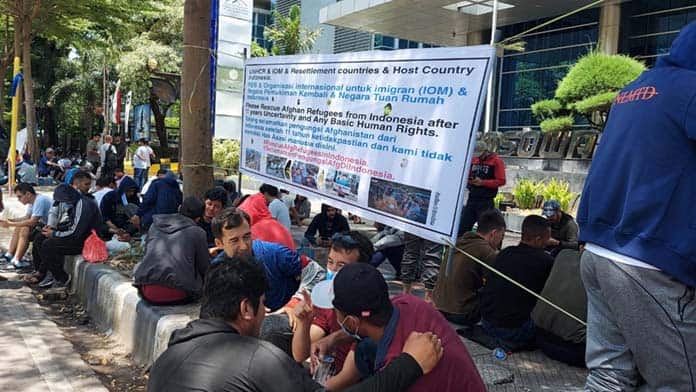Ian Rintoul recently returned from a refugee movement fact-finding trip to Indonesia. He reports on the plight of refugees trapped there by Australian government policy
Operation Sovereign Borders (OSB) began on 18 September 2013 shortly after the election of the Tony Abbott government. OSB is best known for the navy patrols to the north of Australia, and for turning back boats of asylum-seekers. Asylum-seekers who made it to Australian territorial waters were expelled to detention on Manus Island or Nauru.
A key component of OSB was the Regional Deterrence Framework, a program of disruption that was aimed at other countries, particularly Indonesia, to prevent boats carrying asylum-seekers leaving for Australia.
Australia launched a $240 million program of paid village informers, paying bounties for information that led to arrests, boosting the numbers of Federal Police on the ground and even a boat buy-back scheme.
In 2013 and 2014, Australian immigration officials along with the UN refugee agency (UNHCR) toured Indonesia telling asylum-seekers if they didn’t take a boat, they would be processed by UNHCR and resettled in Australia.
Many believed them, registered with UNHCR and waited for the promised resettlement.
One Afghan refugee who arrived in Indonesia in 2013 as a 17-year-old unaccompanied minor told Solidarity: “We were betrayed. I was rejected by Australia in 2015. My family is still in Pakistan.” Many others still have not been referred to Australia for resettlement.
In November 2014, Scott Morrison, then Minister for Immigration, extended the deterrence measures of OSB, announcing that Australia would not accept any refugees who applied through the UNHCR for resettlement after 1 July 2014.
Morrison said he was “taking the sugar off the table” and that the ban “is designed to stop people flowing into Indonesia”. The ban has had a devastating effect.
Until then, Indonesia had been seen as a transit country for asylum-seekers, somewhere they might be temporarily located before moving to a country of permanent protection, usually Australia.
As a result of Morrison’s 2014 ban, Australia began warehousing refugees and asylum-seekers in Indonesia—and Indonesia became as integral a part of Australia offshore regime as Manus Island and Nauru.
Poverty and discrimination
The conditions for refugees being held in Indonesia have not received anything like the attention or scrutiny that has been applied to the conditions on Manus and Nauru.
Australia’s control over refugees and asylum-seekers in Indonesia has been outsourced to the UNHCR and the International Organisation for Migration (IOM), with Australia funding most of the two organisations’ operations in Indonesia.
There are now about 14,000 refugees and asylum-seekers in Indonesia. Most have been there for at least eight years and many for ten years (and more), trapped by Australia’s ban.
Refugees are not allowed to work, study, get a driver’s licence or get married.
While primary age children are officially allowed to go to Indonesian schools, in practice language barriers, discrimination (religious and otherwise) and the lack of official recognition means that most children are excluded from school.
Every week hundreds of refugees in Makassar, Medan, Surabaya and other cities across Indonesia hold protests outside UNHCR offices, demanding resettlement. In Makassar, they sometimes march from the UNHCR to the Australian consulate demanding Australia lift its resettlement ban.
In 2018, refugees and asylum-seekers began to be released from shocking detention centres (also Australian-funded). But the conditions they are now being held in are truly appalling—decrepit, overcrowded and often unhygienic.
They receive a weekly allowance that is well below the Indonesian poverty line and that has been badly cut in real terms by inflation.
The adult allowance is 1,250,000 rupiah (about $125) a month. It has not increased for at least a decade. In Makassar in 2012, a chicken cost 15,000 rupiah; it now costs 70,000 rupiah. In the past four years a kilo of meat has increased from 80,000 to 130,000 rupiah; milk has gone from 11,000 to 20,000; two litres of cooking oil from 22,000 to 40,000; and disposable nappies from 60,000 to 100,000. A basic bus fare in Makassar has doubled from 5000 to 10,000.
IOM claims that the allowance is set by Australia. But in 2014, IOM arbitrarily decreed that adult children of refugee couples would get only the child allowance of 500,000 rupiah (about $50) a month, driving families further into poverty.
IOM restrictions on funding medical treatment is, if anything, worse than IHMS, which operates in Australia’s offshore and onshore detention.

People die waiting for medical attention, including one notorious case where a refugee bled to death in a hospital emergency room while the hospital waited to see if IOM would fund his treatment.
MRIs and CAT scans are routinely refused. Needed dental treatment is declined. Now, refugees can visit a doctor only once a week—anything more has to be paid by themselves. And IOM will no longer pay more than 50,000 rupiah (about $5) for prescribed medicine.
Australian funding cuts have seriously added to refugees’ dire poverty. Refugees who arrived in Indonesia after March 2018 get no allowance at all and, worse, no IOM accommodation.
Afghan wives and children who started to arrive in Indonesia from 2018 to join their husbands and fathers are perhaps the biggest group denied accommodation.
At least 25 families in Makassar are unsupported. One Afghan family in Jakarta of two parents and six children is receiving just one adult allowance of 1,250,000 rupiah. The family lives in a derelict military building in Kalideres (near the infamous detention centre known by the same name) with about 150 other Afghan and Pakistani refugees.
Two women have given birth in Kalideres because as unsupported refugees they are denied medical assistance.
In most accommodation there is a curfew. Refugees are not allowed to travel outside their designated city. They can be arrested and put into detention centres, usually needing to bribe immigration officers to be released.
The fact that refugees cannot lawfully drive or ride motorcycles makes them vulnerable to police harassment for bribes. Refugees are required to report to Indonesia immigration each month. Failure to report for three months can see refugees arrested and detained.
Resettlement
UNHCR has stopped interviewing asylum-seeker arrivals to assess their refugee claims, adding to the despair.
UNHCR dismisses criticisms by insisting that Indonesian law does not distinguish between refugees and asylum-seekers. But being in limbo adds to the uncertainty—without recognition as a refugee, there is no hope of resettlement anywhere.
The despair is taking a terrible toll on refugees’ mental health. There have been 17 suicides since 2018 and many other suicide attempts in IOM accommodation blocks. And the “resignation syndrome” that emerged because of prolonged detention on Nauru and PNG is also rife in Indonesia, with high levels of medication and refugees unable to come out of their rooms.
In 2020 only 403 UNHCR refugees were resettled to a third country from Indonesia and just 457 in 2021. Just 69 were resettled in February 2022.
Although Morrison said that UNHCR refugees registered before his arbitrary cut-off of July 2014 were eligible for resettlement in Australia, there are more than 1000 of them still waiting in Indonesia after more than eight years.
It is part of Morrison’s shocking record on refugees that he cut the humanitarian intake from 18,750 to 13,750 in 2020, having failed to meet the annual target since 2019 by over 14,000 places. Australia could easily make up part of Morrison’s failure by taking all those refugees currently in Indonesia.
As one refugee who arrived in Indonesia as a 16-year-old in 2012 told Solidarity: “Australia is perfectly capable of taking all refugees from Indonesia. We are not a big number.”
But the only commitment that Labor has made regarding refugees in Indonesia is to continue Morrison’s policy of processing refugees registered before July 2014.
Labor is committed to raising the humanitarian quota to 27,000: why is it waiting?
There are many issues that need to be addressed. UNHCR will not refer refugees who are married to Indonesians to be resettled, but the refugees cannot work in Indonesia. Unstated priorities look like discrimination: how else do you explain that no Rohingyan refugees have been resettled to Australia since 2012 and that African refugees who arrived before July 2014 have been told by UNHCR that Australia will not accept refugees from Sudan and Somalia.
Inexplicably, scores, possibly hundreds, of refugees who arrived before July 2014 (including some who worked for the US and Australian defence forces in Afghanistan) have been referred to Australia, only to be rejected. Many look to be victims of a policy to reject UNHCR refugees from Indonesia even before it was formally announced in November 2014.
The ban has created a mass of anomalies. One Afghan refugee in Cisarua travelled to Indonesia in the hope of joining her husband, who had travelled by boat to Australia before 2013 and is now an Australia citizen. She has been denied resettlement but, as an Australian citizen, her husband has been able to visit his wife in Indonesia. The couple now have four Australian citizen children.
Australia’s ban on accepting refugees from Indonesia has to go. The warehousing of refugees in Indonesia is as much a part of Australia’s border protection regime as boat turnbacks and offshore detention in Nauru. The refugee movement has raised the issue of Morrison’s ban since he imposed it in 2014.
Now, along with ending mandatory and offshore detention, the movement needs to demand that Labor ends the ban and brings the refugees here.






